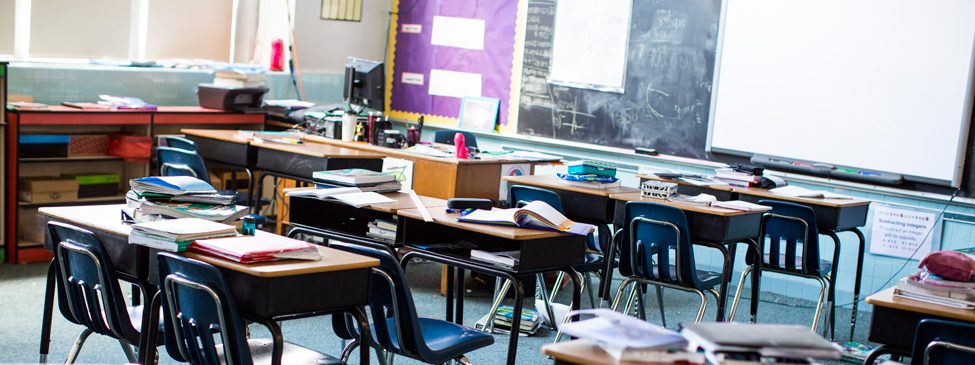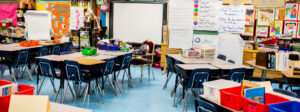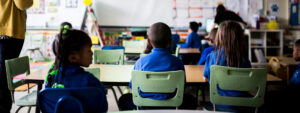Jessica Nauiokas is Principal of Mott Haven Academy Charter School in the Bronx, which she founded in 2007. Haven is the first school in the country created to support students in the child welfare system, and during the 2016-2017 school year, we partnered with them to support their middle school design efforts.
Jessica spoke with us about how she and the rest of the folks at Haven go about creating a supportive culture focused on social-emotional learning, without sacrificing academic rigor.
Can you tell us a little bit about Haven? What makes it a special place?
Haven Academy was developed for the specific purpose of meeting the educational needs of students in the child welfare system. A group of educators and social workers recognized that this population of students is largely overlooked by our traditional systems, and that’s how it all started.
It happens far too often that, before you know it, a kid gets moved four or five times. That means the child gets introduced to a new school and new teachers and new classmates four or five times—all before they’ve made it to second grade. And then, at some point, a well-intentioned educator refers the student for special education evaluation, when the real issue has been this disruption to schooling. So, despite the best efforts of several teachers and caretakers, the student never ends up getting the rigorous education they deserve.
But what if we could disrupt this pattern, and the many other challenges kids in care face, even as early as kindergarten or pre-kindergarten? We’ve got the opportunity to make a significant, lasting impact on their educational outcomes—and that’s what we’ve been doing for 350 kids a year for the past 10 years.
In practice, how does this affect your approach to instruction and culture?
I always say that, as an educator, I spend just as much of my time intentionally planning for students’ social-emotional development as I do their academic development. For example, on curriculum, we don't just think about curriculum in reading, writing, math, science, and social studies. We also think about curriculum in character development, discipline, responsibility, and self-advocacy. And we do this work, not just because we believe it’s ethically right, but because these are skills students need to thrive academically.
One way we accomplish this is by paying attention to the learning materials we purchase, making sure they’re both academically rigorous and supportive of students’ emotional learning. For example, all our classrooms have robust libraries that represent a diverse range of races, ethnicities, and experiences, both fiction and nonfiction. We want kids to see themselves in what they’re learning—reading a book about living with a foster mom, reading a book about having two dads, reading a book about a shelter being your home, reading a book about your parent dying, reading a book about having a sibling who might be in a hospitalized setting or incarcerated—all of this normalizes these stories so students can use them in their writing, and better understand themselves and each other.
What are some core strategies you’ve found most useful in meeting students’ social-emotional needs?
We do a lot of preventative counseling that supports kids through significant transitions and other challenges that might come up, and we have a large team of social workers, psychologists, psychotherapists, and other specialists that help us with this.
Let's say a family indicates that they're going to be moving into a shelter. Instead of just knowing about it and watching for problems, we assign a team of folks to help the child think through what that transition means for them and their family. Also, we make sure the food situation is going to be appropriate during the transition, that transportation is going to be handled appropriately, that hygiene and uniforms and everything that can be disrupted during a big move like that is taken care of.
What do you do to prepare educators to champion Haven’s values and culture?
It all starts with hiring. The two most important questions I ask when interviewing potential staff are around their sense of empathy, and their understanding of our students’ circumstances and how those circumstances came to be. This second piece is connected to empathy, but there's a little bit of nuance there between what a person understands as the cause of the challenges our students face, versus just being able to have empathy for a student and what they're experiencing.
When it comes to professional development, we make sure our team members understand attachment theory, attachment disorders, and how to build the positive relationships that allow them to really push kids academically. At the same time, we work to build the instructional skills of our team members so they know how to differentiate instruction based on what our kids have experienced in the past, both academically and socially.
How do you prepare teachers and staff to support the academic side of students' needs, without sacrificing the social-emotional learning elements?
A big part of meeting students’ academic needs is making sure everyone understands it's a team approach. The kids in second-grade classroom 201 aren’t just one teacher’s kids; there are social workers, interventionists, special area teachers, and behavior specialists all supporting them. We have to use this collective approach to make sure we don’t miss any opportunities to help a student learn.
In my experience, teachers often feel like they’re the lone champion for their students. We ask so much of teachers that, for them to have to take on watching personal hygiene, watching nutrition, watching all these other warning signs…it's too much for one person to do alone. That's why we have a team of specialized people, a team of adults who each take a piece of that work so our teachers can focus on supporting students academically.
How does Haven go about recruiting students, and how is this different from other charter schools?
Like other charter schools, we open our lottery up to any New York City student, but since we specialize in working with kids in care, we actively work to find these students. In fact, we save two-thirds of our seats for children living in foster care and kids who are from families that are receiving prevention services. This prevention services category is pretty broad, and can mean anything from housing in shelters to domestic violence protection to court-ordered separations…there's a very long list. We're also intentionally targeting families that may have struggled with attendance and with educational neglect, as well as kids who have struggled in other educational environments.
People who know about the charter system sometimes assume that families have chosen to apply to us. What I will say is that families do choose, but there's another layer here. Often students come to us because a caseworker has recommended they apply. We’ve also had a few students come to us because the court mandated it.
What does parent, family, and caretaker engagement look like?
We approach everything with families the same way we do with students: It's about building trusting relationships and making sure the time we spend together is structured and consistent and has meaningful goals and outcomes. Because families come to us in a variety of ways, we have some parents who are great partners in our work and others where we have to build their trust to have them understand the benefits of keeping their child at Haven.
We also provide training to our teachers on how to build relationships with family members that, in the past, may have been at a school that called the Administration for Children's Services on them. We don’t want what has happened to families in the past to be a barrier to a caretaker being able to partner with us.
There’s also the extra layer of engaging social workers, caseworkers, and case planners, as well as biological parents when children in foster care are allowed to have visitations with these family members. We've got a range of people involved in our students' lives, and we make an effort to connect with all of them.
Can you tell us about a student who you've seen thrive, and about some of the features of Haven that helped this student thrive?
A little girl who came to us as a first-grader comes to mind. I’ll call her Dee. We had limited information about why she went into foster care, but we knew neglect and physical abuse were involved. We also knew that she and her two siblings had been removed from the traumatic living situation, and were staying with a relative in a safe and caring environment.
The early days with Dee were tough. She would throw tantrums. She would appear to be defiant. She would have these stubborn fits that were really hard on her teacher and the other team members. And sometimes she would get physical, which was not only challenging for the adults, it was dangerous for the other kids, too.
We relied heavily on our safety plan, our communication plan with the foster parent, and our response plan for when Dee threw a tantrum—but after a year, her behavior was virtually unchanged. We decided we wanted to keep her in first grade because she wasn't ready academically for second grade, and the teacher thought another year in the same classroom would help her feel more comfortable and safe. So now we're talking two years of the same work, and also the same tantrums, the same stubbornness, and the same physical outbursts.
But over time those outbursts started to become fewer, and over time her ability to connect with her teachers and make attachments to adults grew stronger. We continued our therapeutic and social-emotional interventions like preventative counseling, art therapy, stress management modeling, and small-group work focused on confidence and relationship-building.
Fast forward a year or two, and she came to trust, and ultimately love, several of her teachers and other team members. At that point, we were able to focus on academics, working to make up what she missed from not having a real kindergarten year, or even an appropriate first-grade year. As a result, by the time she was a fourth-grader, she was able to take on extracurricular activities and was approaching grade level academically.
Though Dee graduated from Haven as a fifth-grader, she still comes back because she's part of one of our music clubs. To see her now as this independent, confident young woman, and to see the deep empathy she has for others, and to think about how well she's doing academically—I won’t say she’s a completely different person, because she’s not, she’s the same little girl that came to us several years ago, actually kicking and screaming. The difference is, now she has the skills, resources, and supports she needs to succeed.





